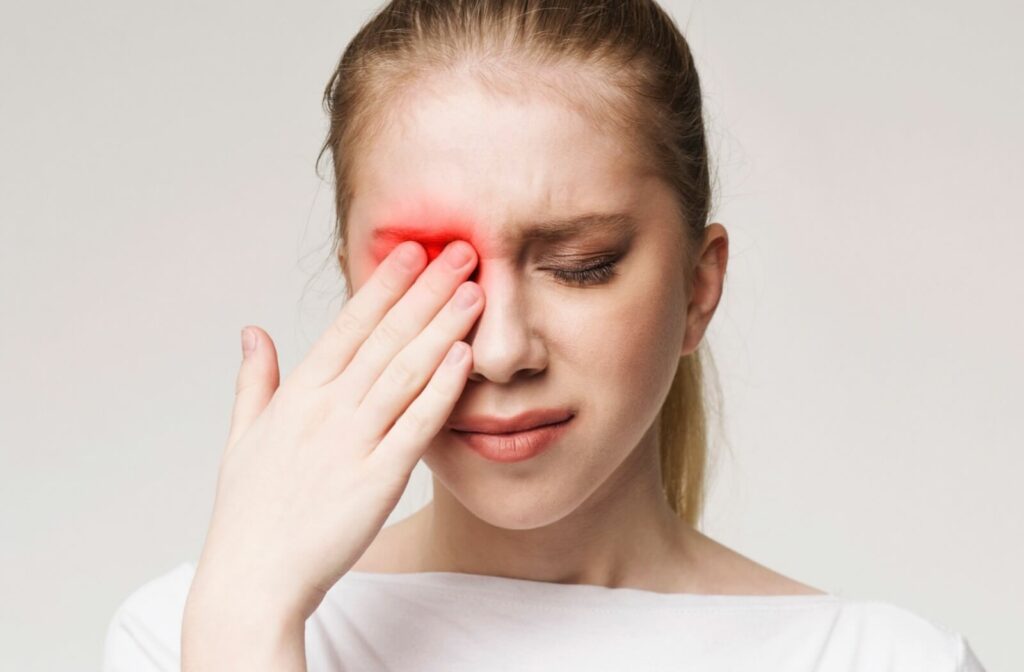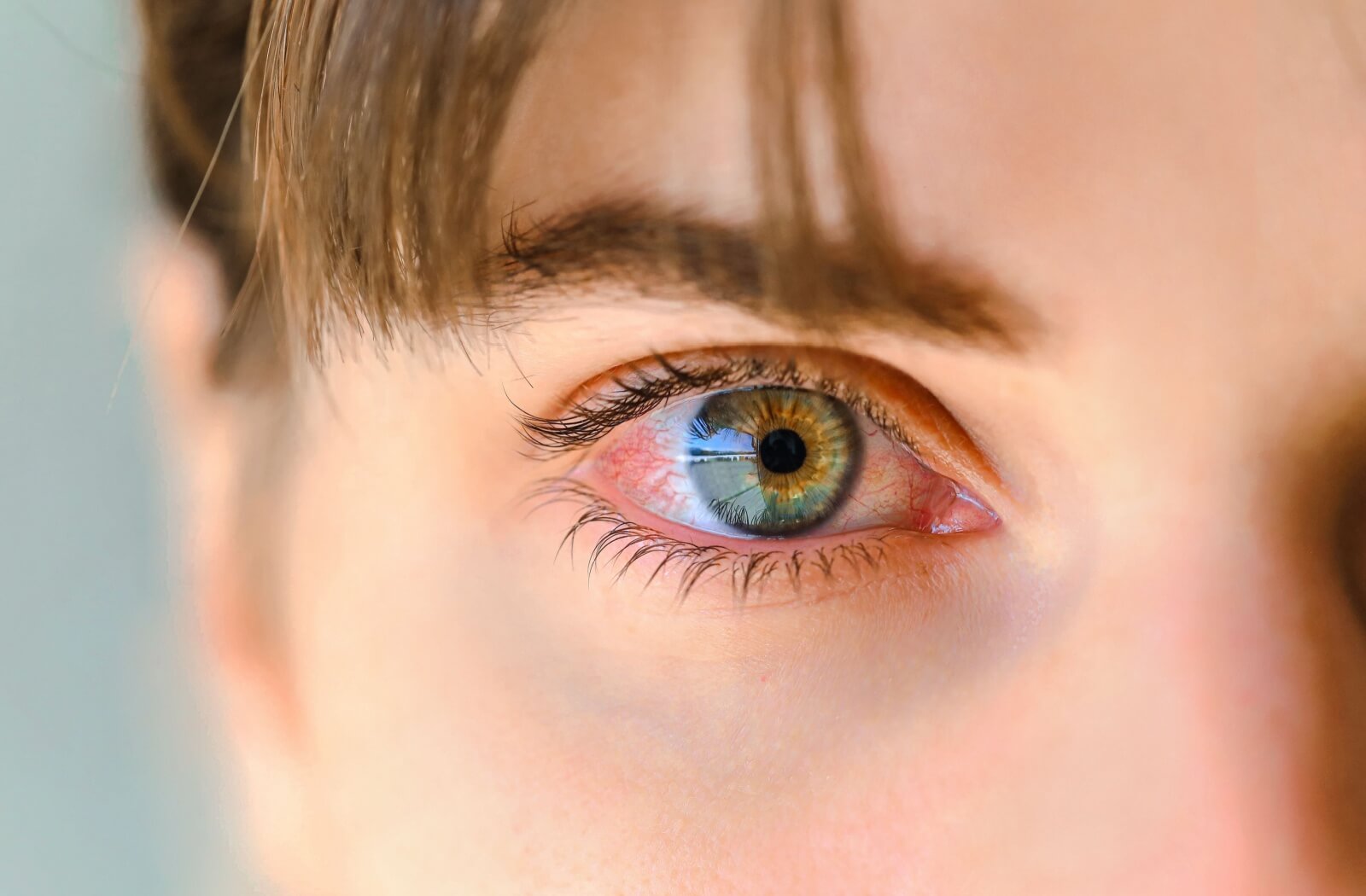Waking up with burning eyes can be an uncomfortable and frustrating way to start your day. While occasional irritation may not be a cause for concern, persistent morning eye discomfort could indicate an underlying issue. Common causes of burning eyes in the morning include:
- Dry eye syndrome—a lack of sufficient tear production overnight
- Allergies—pollen, dust mites, or pet dander in your bedroom
- Poor sleep hygiene—sleeping with contacts in or not removing eye makeup properly
- Blepharitis—inflammation of the eyelids that worsens overnight
- Environmental factors—dry indoor air or excessive screen time before bed
If your eyes frequently burn in the morning, it’s important to address the root cause to protect your long-term eye health. Scheduling an eye exam can help determine if you have an underlying condition, and exploring dry eye treatment options can provide lasting relief.
Common Causes of Burning Eyes in the Morning
Dry Eye Syndrome
Dry eye syndrome occurs when your eyes don’t produce enough high-quality tears, leading to irritation, burning, and discomfort. Since tear production naturally slows at night, people with dry eye often wake up with symptoms like:
- A stinging or gritty sensation
- Redness or inflammation
- Blurry vision that improves after blinking
Factors that contribute to dry eye include age, certain medications, dehydration, and prolonged screen use. Using lubricating eye drops before bed, staying hydrated, and investing in a humidifier can help reduce morning dryness.
Allergies & Irritants in Your Bedroom
Your sleep environment plays a major role in eye health. Allergens like dust mites, pet dander, and pollen can trigger inflammation, leading to burning, itchy, and watery eyes in the morning. Common bedroom irritants include:
- Pillows and bedding that collect dust and allergens
- Sleeping with pets in your bed
- Ceiling fans that circulate airborne irritants
Washing your pillowcases and sheets frequently, using an air purifier, and keeping pets out of the bedroom can help minimize allergic reactions. If allergies are a recurring issue, antihistamine eye drops may provide additional relief.
Poor Sleep Hygiene
How you care for your eyes before bed can directly impact how they feel in the morning. Certain habits can cause irritation, including:
- Sleeping with contact lenses in, leading to reduced oxygen flow to the eyes
- Leaving eye makeup on overnight, which can clog oil glands and cause inflammation
- Not blinking enough before bed, particularly if you’ve been using screens for extended periods
To protect your eyes, always remove your contacts before sleeping, cleanse your eyelids thoroughly, and take screen breaks in the evening to allow your tear film to regenerate.

Eyelid Conditions That Cause Morning Discomfort
Blepharitis
Blepharitis is a common condition that results from clogged oil glands at the base of the eyelashes. It often leads to:
- Burning, red, or irritated eyes in the morning
- Crusty or flaky debris along the lash line
- A sensation of something in your eye
Because blepharitis symptoms worsen overnight, people often wake up with discomfort. Maintaining proper eyelid hygiene—such as using warm compresses and cleansing wipes—can help prevent irritation.
Nocturnal Lagophthalmos
Nocturnal lagophthalmos occurs when your eyelids don’t fully close while sleeping, causing excessive tear evaporation. This can lead to:
- Waking up with dry, burning eyes
- Sensitivity to light in the morning
- A need to blink multiple times before vision clears
If you suspect nocturnal lagophthalmos, an eye care professional can recommend treatments like lubricating ointments or moisture goggles to keep your eyes hydrated overnight.
Environmental Factors That Contribute to Eye Irritation
Your sleep environment can significantly impact your eye comfort. Some common environmental triggers include:
- Dry indoor air: Heated or air-conditioned rooms can reduce moisture levels, leading to increased tear evaporation.
- Ceiling fans and heaters: These can circulate dust and dry out your eyes while you sleep.
- Blue light exposure before bed: Extended screen time can disrupt melatonin production and reduce natural blinking, worsening dry eye symptoms.
Using a humidifier, adjusting airflow in your bedroom, and limiting screen time before bed can help create a more eye-friendly sleep environment.
How to Prevent Burning Eyes in the Morning
If you frequently wake up with eye discomfort, making small adjustments to your routine can help prevent irritation. Consider the following:
- Use lubricating eye drops before bed to keep your eyes hydrated overnight.
- Maintain proper eyelid hygiene by removing makeup and cleansing your eyelids and lashes to prevent blockages.
- Adjust your sleep environment by using an air purifier, avoiding fans directed at your face, and keeping your bedroom dust-free.
- Limit screen time before bed to reduce eye strain and improve tear quality.
- Stay hydrated by drinking enough water throughout the day to support tear production.
When to See an Eye Doctor
While occasional eye irritation is normal, persistent burning or discomfort could indicate an underlying condition that requires medical attention. You should see an eye doctor if:
- Your symptoms persist despite lifestyle changes.
- You experience severe redness, swelling, or discharge.
- Your vision becomes blurry or you develop light sensitivity.
- Your eyes feel painful rather than just irritated.
A professional eye exam can help pinpoint the cause of your symptoms and provide personalized treatment options to protect your long-term eye health.
Find Relief for Your Burning Eyes
Waking up with burning eyes can interfere with your daily routine, but identifying the root cause can help you find effective relief. Whether your symptoms stem from dry eye syndrome, allergies, or environmental factors, making small changes to your sleep habits and seeing an eye care professional at Vivid Eye Care can make a significant difference. Learn more about our comprehensive eye care services and find solutions tailored to your needs.






















